Review: The Machine Stops – “you are entering a new world”
May 22, 2016

All photographs credited to Ben Bentley
It is an intimate experience being immersed into E.M. Forster’s dystopian vision. His short story was adapted for the stage by playwright, Neil Duffield, who ‘decided to remain as faithful to the original as possible’.
On entering the studio space you are entering a new world, the world of The Machine, a hexagonal metal frame work; a cell in more ways than one. The multi-purpose set designed by Rhys Jarman is both simplistic and complex. It works as a device to convey change of scene, location, and it explores the mechanics – by way of the physical acting of Maria Gray and Gareth Aled who play The Machine. Their acrobats bring the static set alive, becoming fluid, as one, they respond to the demands of Vashti, one of the two main human characters.
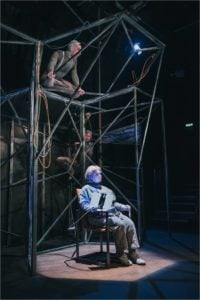 The cast dress in grey as if they too are part of The Machine, each needing the other to exist; a symbiotic relationship.
The cast dress in grey as if they too are part of The Machine, each needing the other to exist; a symbiotic relationship.
Vashti (Caroline Gruber) for the most part represents a person of high regard. Caroline plays this strong woman with her ideals and her unwavering allegiance to The Machine with conviction. There are awkward interactions with Kuno (her son) and touching moments when Vashti’s vulnerability shines through in a world where feelings are not shared and ‘direct contact/experience’ is frowned upon. Vashti is not only constrained to her room, but by space, time, and the responsibility of others’ needs and expectations.
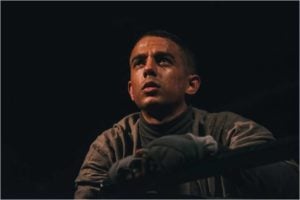 In contrast, Kuno (Karl Queensborough) aspires to break free from his confines, to reach for the skies. He is a thinker and sees this world of the all-consuming Machine as being a slave. Kuno is all about drama – another physical role – as he re-enacts his journey beyond the room to his mother, Vashti. This is where Karl shines, moving the story forward onto another level of understanding, of hope.
In contrast, Kuno (Karl Queensborough) aspires to break free from his confines, to reach for the skies. He is a thinker and sees this world of the all-consuming Machine as being a slave. Kuno is all about drama – another physical role – as he re-enacts his journey beyond the room to his mother, Vashti. This is where Karl shines, moving the story forward onto another level of understanding, of hope.
Music by John Foxx and Benge is an integral part of the plot. In fact, on entering the subdued studio you are entering the underground world with its dark bassy tones and the continuous slow rhythmic sounds of The Machine breathing, alive, ever present in the background. Electronic music is a fitting soundtrack that directs The Machine’s choreography, change of scene as the drama unfolds.
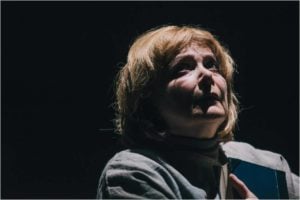 A poignant ending when The Machine does indeed stop, and the realisation that we are living in a world where dependence on technology has never been more relevant than today.
A poignant ending when The Machine does indeed stop, and the realisation that we are living in a world where dependence on technology has never been more relevant than today.
The cast of four are directed by Juliet Forster in a seamless one and a half hours that draws you fully into another world. The Machine Stops captures the sense of space and isolation, the interplay between man and machine, and the dynamics between a mother and a son. This play relates to today’s audience whose reliance on technology is reflected in E.M. Forster’s uncanny vision. Does it enhance or impede communication? What about our physical and virtual relationships? The Machine provides a platform to question these ideas.
Don’t miss The Machine Stops, playing at York Theatre Royal until 4 Jun 2016.
Filed under: Theatre & Dance
Tagged with: E.M. Forster, Neil Duffield, The Machine Stops, theatre, York, York Theatre Royal
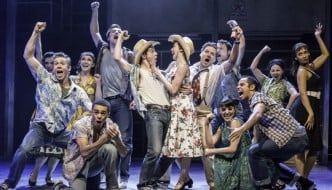

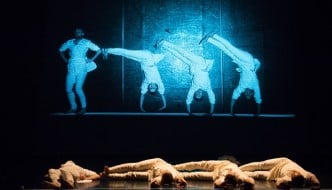
Comments